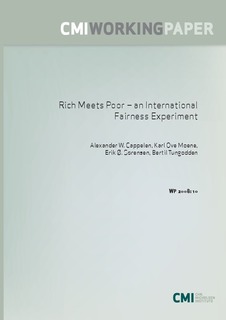| dc.description.abstract | Why do people in rich countries not transfer more of their income to people in the world’s poorest countries? To study this question and the relative importance of needs, entitlements, and nationality in people’s social preferences, we conducted a real effort fairness experiment where people in two of the world’s richest countries, Norway and Germany, interacted directly with people in Uganda and Tanzania, two of the world’s poorest countries. In this experiment, the participants were given the opportunity to transfer money to poor persons with whom they were matched. The study provides four main findings. First, entitlement considerations are crucial in explaining the distributive behavior of rich people in the experiment; second, needs considerations matter a lot for some participants; third, the participants acted as moral cosmopolitans; and finally, the participants’ choices are consistent with a self-serving bias in their social preferences. | |
